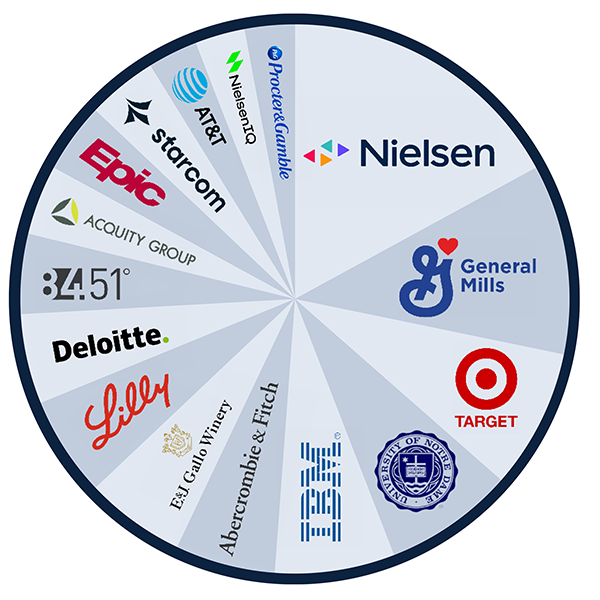Marketing

A framework for success in marketing
Ranked highly in the nation, the Department of Marketing at the Mendoza College of Business uses the 5C/STP/4Ps marketing management framework as its foundational model.
You will learn from world-renowned scholars and award-winning professors.
The curriculum allows you to make the connections between your classes and the roles and responsibilities of marketing in organizations and society.
Experience is the greatest teacher
During your time at Notre Dame, you’ll have the opportunity to learn from a wide range of experiences: study abroad, internships and research, classes that emphasize experiential learning, and the professional expertise our faculty members bring to the classroom.

More than 75 percent of Notre Dame undergraduates study abroad
This experience is particularly formative for marketing majors interested in learning firsthand what drives marketing and consumer behavior in international markets. Choose from 67 programs across 26 countries. No matter which destination you choose, you’ll return to campus with a deeper understanding of how the business you conduct throughout your career impacts the world at large.

An ethical approach
Yes, our rigorous curriculum will prepare you to solve complex marketing challenges. But more importantly, the solutions you devise to these challenges will be informed by a deep sense of ethics strengthened during your time at Notre Dame.

Once a Domer, always a Domer
The strength, accessibility and engagement of the Notre Dame alumni network are virtually unparalleled. We take care of own, during and after your time on campus. Find Notre Dame alumni working in Marketing on our LinkedIn page.
Career Support
Learn to market yourself.
How you build your personal brand and market yourself to employers is becoming increasingly important. As a student at Notre Dame, you’ll have access to the resources of the ND Career Center, the guidance of your professors and peers, and opportunities to intern, serve and conduct research—all of which will help you prepare for a new career or further study in graduate school.
Largest Employers of Recent Marketing Majors
Represents companies employing 5+ graduates

Student Life
When you’re not meeting the demands of top-ranked marketing faculty in the classroom, you’ll have the chance to participate in one of the most distinctive campus experiences in the country.
- Help market your residence hall’s signature event—all 32 halls have their own nickname, mascot, charity and special event.
- Join the Marketing Club or Retail Club
- Serve through the Center for Social Concerns (more than 80 percent of undergrads serve)
- Attend Football Saturdays and take part in a number of Notre Dame-specific traditions
What You’ll Learn
The marketing curriculum offers both breadth and depth. Marketing majors must complete two required courses: Consumer Behavior and Marketing Research. In addition to these, students can choose to pursue one of three specialized tracks: Brand Management, Digital Marketing, or Marketing Analytics. While these tracks provide focused expertise, they are optional, and students are free to select electives aligned with their academic interests. Beyond the Foundations of Marketing course, marketing majors are required to complete seven marketing courses, including the two core courses, Consumer Behavior and Marketing Research.
Brand Management Track
![]()
The Brand Management track prepares students to oversee the image and success of a product or service. Brand managers develop and implement marketing strategies designed to enhance brand awareness, foster customer loyalty, and increase market share. Their responsibilities include managing product development, packaging, advertising campaigns, and promotional initiatives. In addition, brand managers closely analyze market trends and consumer behavior to ensure their brand remains competitive and relevant. They collaborate with cross functional teams, such as sales, research and development, and creative departments, to maintain a consistent brand message across all channels. Ultimately, brand managers play a critical role in shaping consumers’ perceptions and driving long term business success.
Brand managers work across various industries, including consumer goods, technology, retail, healthcare, and luxury products. They are often employed by companies that rely heavily on strong branding to differentiate themselves in the marketplace.
Courses in this track include: Building Great Brands, Advertising Management, New Product Development, Sports Marketing, and Business Markets & Sales
Digital Marketing Track

The Digital Marketing track focuses on harnessing the power of digital channels to engage customers and strengthen brand awareness. Digital marketers develop and implement strategies to connect with target audiences through platforms such as search engines, social media, email, and websites. They create and optimize content, manage paid advertising campaigns, and use analytics tools to measure and refine their efforts. Staying up-to date with industry trends and algorithm changes is crucial, as it ensures that digital strategies remain effective in the fast-evolving digital landscape. The ultimate goal of digital marketers is to boost customer engagement, drive online traffic, and convert leads into loyal customers.
Digital marketers find opportunities across various industries, including e commerce, technology, retail, and media. They often work for companies with a strong online presence or in marketing agencies that manage digital campaigns for multiple clients.
Courses in this track include: Digital Marketing, Social Media Strategy, Applied Digital Marketing, and Managing Digital Engagement.
Marketing Analytics Track

The Marketing Analytics track emphasizes the use of data analytics and marketing models to drive informed decision-making. Professionals in this field gather, analyze, and interpret large datasets from sources such as customer behavior, sales, and market trends. They develop actionable insights that help businesses optimize marketing strategies, improve campaign performance, and maximize return on investment. In addition, marketing analysts use predictive models to anticipate future trends and customer preferences, enabling companies to stay competitive in dynamic markets.
Marketing analytics professionals work across a variety of industries, including technology, retail, finance, and healthcare. They are often employed by large corporations where data driven strategies are critical to success, as well as by specialized analytics firms or consulting agencies that offer insights to various clients. Many also hold roles within marketing departments or research teams in industries like consumer goods, media, and e-commerce.
Courses in this track include: Marketing Analytics, Pricing Analytics, and Customer Valuation Management.
Research Awards & Recognitions
Notre Dame’s Marketing faculty have consistently been recognized with some of the most prestigious awards in the field, honoring their exceptional research contributions. Below are a few examples of the distinguished awards and honors our faculty have received in recent years:
- Distinguished Winner, AMA-EBSCO-RRBM Award for Responsible Research in Marketing, American Marketing Association, 2023
- Financial Times Responsible Business Education Academic Research Award, Financial Times, 2022
- John A. Howard/AMA Doctoral Dissertation Award, American Marketing Association, 2021
- Consumer Behavior SIG’s Rising Star Award, American Marketing Association, 2021
- AMA Interorganizational SIG Lifetime Achievement Award, American Marketing Association, 2022
- AMA Retailing and Pricing SIG Lifetime Achievement Award, American Marketing Association, 2022
- Outstanding Area Editor Award, Journal of the Academy of Marketing Science, 2024
- MSI Scholar, Marketing Science Institute, 2022
- 2021 AMA/Marketing Science Institute/H. Paul Root Award, American Marketing Association, 2022
- Varadarajan Award, American Marketing Association, 2021
- 2020 Sheth Foundation/Journal of Marketing Award, American Marketing Association & Sheth Foundation, 2020
- Top 50 Worldwide in Productivity in the Premier AMA Marketing Journals, American Marketing Association, 2024
- Outstanding Reviewer Award, Journal of Marketing, 2021
- Retail & Pricing SIG Best Paper Award, American Marketing Association, 2021
- Robert J. Lavidge Global Marketing Research Award, American Marketing Association Foundation, 2020
- Marketing Science Service Award, Marketing Science, 2023 & 2024
- Top 50 Worldwide in Productivity in the Premier Marketing Journals, American Marketing Association, 2024
- Journal of Marketing Outstanding Reviewer Award, American Marketing Association, 2023
- Melcher Excellence in Research Award, Bauer College of Business, 2021
- Top Retail Expert, RETHINK Retail, 2024
- Top Retail Influencer, RETHINK Retail, 2023
Recent Publications
Notre Dame’s Marketing faculty regularly contribute to premier marketing and related journals,
demonstrating their cutting-edge research and thought leadership. Below are examples of some
of the articles published by our faculty since 2021, with Notre Dame faculty names highlighted
in bold:
2024:
- Bechler, Christopher J., Samina Lutfeali, Szu‐chi Huang, and Joshua I. Morris. “Working hard for money decreases risk tolerance.” Journal of Consumer Psychology 34, no. 1 (2024): 110-118.
- Umashankar, Nita, Dhruv Grewal, Abhijit Guha, and Timothy R. Bohling. “Testing Work–Life Theory in Marketing: Evidence from Field Experiments on Social Media.” Journal of Marketing Research 61, no. 2 (2024): 307-329.
- Chen, Yixing, Shrihari Sridhar, Kyuhong Han, Sonam Singh, Vikas Mittal, and Taehoon Im. “The Value of Safety Training for Business-to-Business Firms.” Journal of Marketing Research (2024): forthcoming.
- Costello, John P., Aaron M. Garvey, Frank Germann, and James EB Wilkie. “The uptrend effect: Encouraging healthy behaviors through greater inferred normativity.” Journal of Marketing Research 61, no. 1 (2024): 110-127.
- Hock, Stefan J., Kristen A. Ferguson, and Kelly B. Herd. “The mobile giving gap: The negative impact of smartphones on donation behavior.” Journal of Consumer Psychology (2024): forthcoming.
- Ebbes, Peter, Frank Germann, and Rajdeep Grewal. “Getting the Board on Board: Marketing Department Power and Board Interlocks.” Journal of Marketing Research (2024): forthcoming.
- Germann, Frank, Stephen J. Anderson, Pradeep K. Chintagunta, and Naufel Vilcassim. “Frontiers: Breaking the glass ceiling: Empowering female entrepreneurs through female mentors.” Marketing Science 43, no. 2 (2024): 244-253.
- Kanuri, Vamsi K., Christian Hughes, and Brady T. Hodges. “Standing out from the crowd: When and why color complexity in social media images increases user engagement.” International Journal of Research in Marketing 41, no. 2 (2024): 174-193.
- Lu, Shijie, Sha Yang, and Yao Yao. “Within-Category Satiation and Cross-Category Spillover in Multi-Product Advertising.” Journal of Marketing (2024): forthcoming.
- Martin, Andre, and Tarun Kushwaha. “Can Words Speak Louder Than Actions? Using Top Management Teams’ Language to Predict Myopic Marketing Spending.” Journal of Marketing (2024): forthcoming.
- Bradford, Tonya Williams, and John F. Sherry Jr. “How marketers and consumers synchronize temporal modes to cocreate ritual vitality.” Journal of the Academy of Marketing Science 52, no. 2 (2024): 554-575.
- Yang, Joonhyuk, Navdeep S. Sahni, Harikesh S. Nair, and Xi Xiong. “Advertising as information for ranking e-commerce search listings.” Marketing Science 43, no. 2 (2024): 360-377.
- Mariadassou, Shwetha, Christopher J. Bechler, and Jonathan Levav. “The Effect of Auditory and Visual Recommendations on Choice.” Psychological Science 34, no. 1 (2023): 47-59.
- Costello, John P., Jesse Walker, and Rebecca Walker Reczek. “‘Choozing’ the best spelling: Consumer response to unconventionally spelled brand names.” Journal of Marketing 87, no. 6 (2023): 889-905.
- Philipp-Muller, Aviva, John P. Costello, and Rebecca Walker Reczek. “Get your science out of here: When does invoking science in the marketing of consumer products backfire?.” Journal of Consumer Research 49, no. 5 (2023): 721-740.
- Jin, Jianna, Selin A. Malkoc, and Russell H. Fazio. “For whom do boundaries become restrictions? The role of political orientation.” Journal of Experimental Psychology: General 152, no. 7 (2023): 2118.
- Yao, Dai, Shijie Lu, and Xingyu Chen. “Crowding-Out in Content Monetization Under Pay What You Want: Evidence From Live Streaming.” Production and Operations Management (2023): 10591478231224948.
- Kim, Eunsoo, MengQi Ding, Xin Wang, and Shijie Lu. “Does topic consistency matter? A study of critic and user reviews in the movie industry.” Journal of Marketing 87, no. 3 (2023): 428-450.
- Lu, Shijie, Ying Xie, and Xingyu Chen. “Immediate and enduring effects of digital badges on online content consumption and generation.” International Journal of Research in Marketing 40, no. 1 (2023): 146-163.
- Lu, Shijie, Isaac Dinner, and Rajdeep Grewal. “The Ripple Effect of Firm-Generated Content on New Movie Releases.” Journal of Marketing Research 60, no. 5 (2023): 908-931.
- McAlister, Leigh, Frank Germann, Natalie Chisam, Pete Hayes, Adriana Lynch, and Bill Stewart. “A taxonomy of marketing organizations.” Journal of the Academy of Marketing Science 51, no. 3 (2023): 617-635.
- Staelin, Richard, Joel E. Urbany, and Donald Ngwe. “Competition and the regulation of fictitious pricing.” Journal of Marketing 87, no. 6 (2023): 826-846.
- Costello, John P., and Selin A. Malkoc. “Why are donors more generous with time than money? The role of perceived control over donations on charitable giving.” Journal of Consumer Research 49, no. 4 (2022): 678-696.
- Kanuri, Vamsi K., Johannes Habel, Nawar N. Chaker, Deva Rangarajan, and Paolo Guenzi. “B2B online sales pushes: Whether, when, and why they enhance sales performance.” Production and Operations Management (2022).
- Yang, Joonhyuk, Yingkang Xie, Lakshman Krishnamurthi, and Purushottam Papatla. “High energy ad content: A large-scale investigation of TV commercials.” Journal of Marketing Research 59, no. 4 (2022): 840-859.
- Bechler, Christopher J., Zakary L. Tormala, and Derek D. Rucker. “The attitude–behavior relationship revisited.” Psychological Science 32, no. 8 (2021): 1285-1297.
- Chen, Yixing, Vikas Mittal, and Shrihari Sridhar. “Investigating the academic performance and disciplinary consequences of school district internet access spending.” Journal of Marketing Research 58, no. 1 (2021): 141-162.
- Anderson, Stephen J., Pradeep Chintagunta, Frank Germann, and Naufel Vilcassim. “Do marketers matter for entrepreneurs? Evidence from a field experiment in Uganda.” Journal of Marketing 85, no. 3 (2021): 78-96.
- Lu, Shijie, Dai Yao, Xingyu Chen, and Rajdeep Grewal. “Do larger audiences generate greater revenues under pay what you want? Evidence from a live streaming platform.” Marketing Science 40, no. 5 (2021): 964-984.
- Wang, Xin, Shijie Lu, X. I. Li, Mansur Khamitov, and Neil Bendle. “Audio mining: The role of vocal tone in persuasion.” Journal of Consumer Research 48, no. 2 (2021): 189-211.
- Lu, Shijie, Koushyar Rajavi, and Isaac Dinner. “The effect of over-the-top media services on piracy search: Evidence from a natural experiment.” Marketing Science 40, no. 3 (2021): 548-568.
- Ryoo, Jun Hyun, Xin Wang, and Shijie Lu. “Do spoilers really spoil? Using topic modeling to measure the effect of spoiler reviews on box office revenue.” Journal of Marketing 85, no. 2 (2021): 70-88.
- Borghini, Stefania, John F. Sherry, and Annamma Joy. “Attachment to and detachment from favorite stores: An affordance theory perspective.” Journal of Consumer Research 47, no. 6 (2021): 890-913.
- Yang, Joonhyuk, Jung Youn Lee, and Pradeep K. Chintagunta. “Commercial success through commercials? Advertising and pay-tv operators.” Journal of Marketing Research 58, no. 5 (2021): 925-947.
- Yang, Joonhyuk, Eric T. Anderson, and Brett R. Gordon. “Digitization and flexibility: Evidence from the South Korean movie market.” Marketing Science 40, no. 5 (2021): 821-843.
Department Administration

Frank Germann
Chair, Marketing Department
Frank Germann is the Chair of the Marketing Department and Viola D. Hank Associate Professor. Before entering academia, he held various industry positions at Hewlett-Packard and Johnson & Johnson. He also served as an Academic Advisor to McKinsey & Co. His research interests are in the area of marketing strategy, and he has received a number of recognitions for his scholarship, including the 2013 IJRM Best Paper Award, the 2020 Sheth Foundation/JM Award, the 2021 AMA/MSI/H. Paul Root Award, and the 2021 Varadarajan Award. He was selected as a 2017 MSI Young Scholar and as a 2023 MSI Scholar. He has also received several teaching awards to date, including the 2020 Rev. Edmund P. Joyce, C.S.C. Award for Excellence in Undergraduate Teaching. He currently serves as an Associate Editor for the Journal of Marketing, as an Area Editor of JAMS, and on the Editorial Review Board of JMR. He is a co-author of the textbook, “Marketing Analytics: Based on First Principles,” and he teaches Introduction to Marketing to EMBAs and Marketing Research to undergraduates.
Contact: (574) 631-4858 or fgermann@nd.edu

Mitchell Olsen
Assistant Chair, Marketing Department
Mitch Olsen is the Assistant Chair of the Marketing Department, Richard J. Huether Associate Teaching Professor, and Director of Undergraduate Studies in the Marketing Department. His research interests are in marketing strategy, with a specific focus on substantive issues that occur at the intersection of any, and all, of the following sub-areas: (1) Brands, (2) Retailing, and (3) Innovation. His expertise in these areas is regularly sought via interviews with leading national and international news outlets. In his teaching, he enjoys pairing foundational marketing theories with emergent applications of those theories in practice – informed by his work experience at Procter & Gamble and his active research on firms in the retail and consumer packaged goods industries.
Contact: (574) 631-1734 or molsen2@nd.edu

